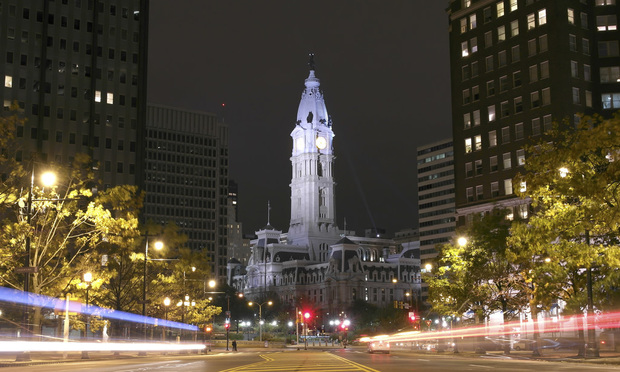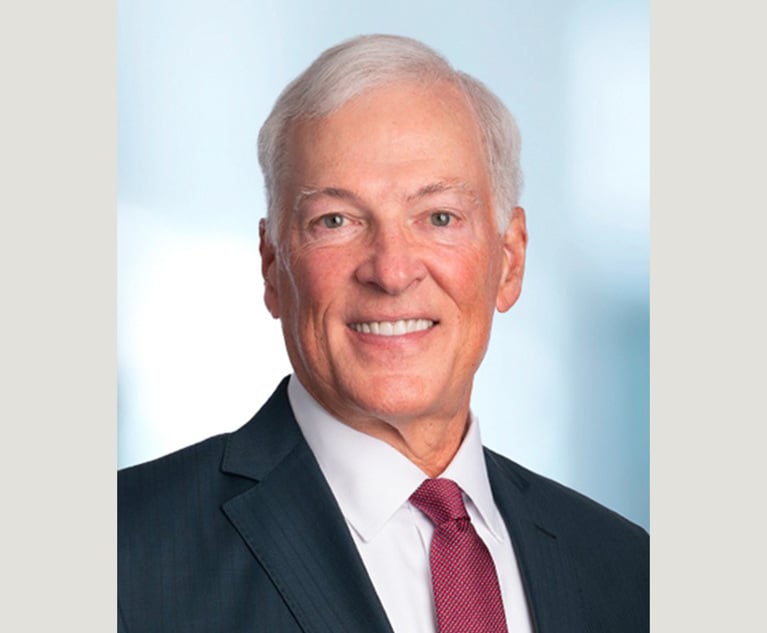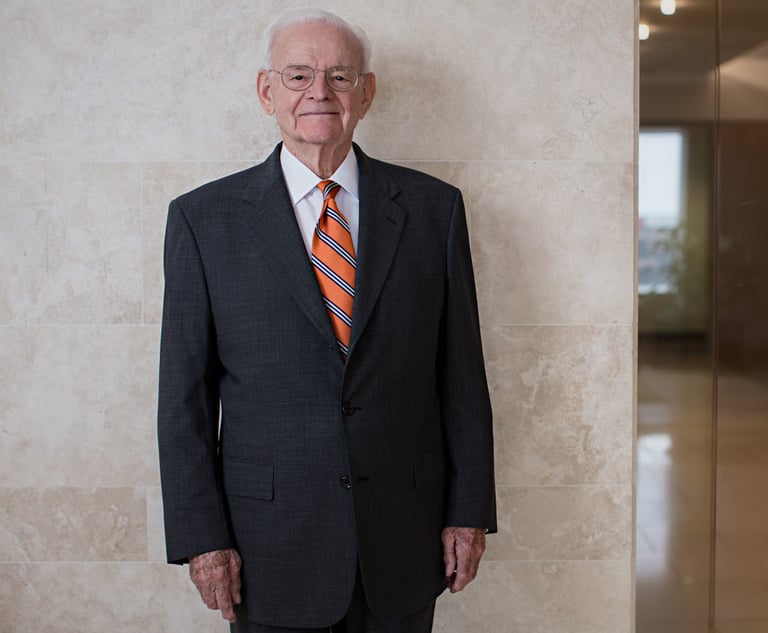 Philadelphia City Hall. Photo: Fotolia.
Philadelphia City Hall. Photo: Fotolia. Phila. Judge Who Removed Case From DA Has History of 'Prosecuting From the Bench,' Lawyers Say
Philadelphia Judge Anne Marie Coyle shocked many lawyers when she appointed a special prosecutor to handle a case over the objections of several assistant district attorneys. But others who have practiced before her said the appointment fit with a pattern for the judge—one where she appears to take away the reins from prosecutors.
October 17, 2018 at 05:12 PM
11 minute read
Philadelphia Judge Anne Marie Coyle shocked many lawyers when she appointed a special prosecutor to handle a case over the objections of several assistant district attorneys. But others who have practiced before her said the appointment fit with a pattern for the judge—one where she appears to take away the reins from prosecutors.
Several attorneys pointed to the jury selection that occurred in a case captioned Commonwealth v. Senestant as an example.
According to court transcripts, the process began the way many jury selections do at the Criminal Justice Center, where questionnaires from potential jurors are divided into an A and a B pile. Typically, the A pile consists of potential jurors who answered no to just about every question meant to gauge potential biases, and the B pile has all the potential jurors who answered yes to those questions. For the sake of expediency, the parties cycle through the A pile first, since those are the jurors mostly likely to be seated. Or in some cases, as in Senestant, the jurors from the B pile were dismissed at the beginning of the proceedings.
However, according to court papers, Coyle divided the A and B pile at a pair of questions that ask potential jurors whether they "would be more likely to believe the testimony of a police officer, or any other law enforcement officer because of his or her job," and whether they "would be less likely to believe the testimony of a police officer or the law enforcement officer because of his or her job." Those who made it into the A pile answered that they were more likely to believe police officers, and those who said they were less likely to trust police were placed in the B pile.
The first day of jury selection proceeded as usual, with attorneys from both sides prioritizing the A pile. But, on Jan. 21, 2015, the second day of jury selection, the defense attorney, Pierre LaTour, said he noticed the unusual division between the piles. He objected, saying neither he nor the prosecutor on the case were aware that the judge had included those jurors in the A pile, and that giving priority to jurors more likely to believe police fundamentally tainted the jury.
After LaTour's objection, Coyle asked for a response from the prosecutor, but the assistant district attorney deferred to the judge, saying, "I mean, I would leave it up to Your Honor. I've—I don't know," transcripts said.
Coyle responded by saying she placed jurors who indicated that they are less likely to believe police in the B pile "because it's been my experience that those that check off those categories are far less likely to indicate that they can serve fairly." She then overruled LaTour's objection.
Coyle ultimately reversed herself on that ruling several hours later, but, according to LaTour and a former Philadelphia prosecutor with familiarity with the case, it was only after both sides argued that the jury selection process had been problematic.
The next day LaTour requested Coyle recuse from the case. She denied the request, and the Superior Court denied the defendant's appeal.
Defense attorneys still talk about the case.
"That one was really disturbing," Greenblatt, Pierce, Funt & Flores attorney Ron Greenblatt said.
LaTour, who sent spent five years as a Philadelphia assistant DA, said in a recent interview with The Legal he had been "shocked" by the jury selection process.
"I will say that when I read the story about the special prosecutor incident that spread like wildfire in the defense bar, I wasn't surprised," he said.
Coyle declined to comment for this story.
At least one conviction was recently overturned due to what a Superior Court panel characterized as Coyle "appear[ing] to have assumed the commonwealth's role as an advocate."
On Tuesday, a unanimous three-judge Superior Court panel ordered a new trial in the case Commonwealth v. Decosta. According to Superior Court Judge John Bender, who wrote the court's opinion, the defendant faced several charges, including aggravated assault and making terroristic threats; however, the defendant was hospitalized with sepsis before the second day of jury deliberations could begin. The defense attorney said the defendant was sedated and objected to the trial proceeding without the defendant present. Coyle, however, continued with jury deliberations, and the defendant was found guilty.
On appeal, Coyle said the defendant had been absent without cause, and that she believed the defendant had "deliberately attempted to commit suicide in order to avoid his trial," according to Bender.
The Superior Court said Coyle improperly shifted the burden of proof onto the defendant, and based her findings about the defendant's alleged suicide attempt on "hearsay speculation." The appellate court further said it appeared that Coyle had not been "acting as a neutral arbitrator of justice."
"Indeed, the district attorney did not once oppose appellant's motion to stay or motion for a mistrial, nor even weigh in at all on the court's deliberations regarding appellant's absence," Bender said. "As such, we conclude that the trial court abused its discretion."
Special Prosecutor
According to a candidate questionnaire from The Philadelphia Inquirer, Coyle spent 16 years at the Philadelphia District Attorney's Office, where she worked in the homicide, drugs, computer crime, juvenile and government fraud units. She eventually became an assistant chief of the major trials unit, before leaving the office to work as a family law attorney in South Philadelphia.
Coyle was elected judge in 2013.
Some attorneys who spoke with The Legal said they are friendly with Coyle off the bench, and that she is smart and very well-versed in the law. However, almost all of the attorneys, many of whom declined to speak on the record for this story, agreed she sometimes appeared to overstep her role.
According to Greenblatt, who formerly chaired the Philadelphia Association of Defense Counsel, defense attorneys have long complained about Coyle.
"She's the judge that we received by far the most complaints about," he said. "Quite frankly, if she wants to run for DA, she should resign and run for DA. But this is the system we have."
Coyle recently made headlines after she appointed a special prosecutor to pursue a violation of probation hearing in the case Commonwealth v. Mayfield.
According to court papers, the defendant had previously been convicted on a gun charge and was out on probation when he was arrested in early September on new charges related to alleged gun and drug possession.
Court records show the Philadelphia District Attorney's Office chose to delay the defendant's violation of probation hearing until after he has been tried on the latest charges. Prosecutors contended that they were within their discretion to delay the hearing, but, in fiery courtroom exchanges, Coyle determined that prosecutors from the DA's Office had "removed themselves" from handling the case, and, on Sept. 19, she appointed a special prosecutor to handle the parole violation hearing.
The defendant, who has been in jail since the second arrest, appealed the appointment, and the case has been stayed pending the Superior Court's review.
In the wake of that appointment, several defense attorneys and former prosecutors told The Legal the move appeared to violate the separate of powers doctrine.
Others said it fit a pattern.
"She can't seem to rise above her point of view as a former prosecutor," West Chester defense attorney Sam Stretton said, adding he felt that, off the bench, Coyle was "a lovely person."
"Whatever frustration the judge might have, you have to remember the limitations of your role. When you start to mingle it, you lose your impartiality and your ability to hear the case," Stretton said. "The intentions may have been good, but it's not a good practice."
Bail and Appeals
Along with complaints about imposing sentences harsher than what prosecutors called for, attorneys also said Coyle has a history of increasing bail when defendants appear late in court, even when prosecutors have not asked for increased bail.
A recent example comes in the case Commonwealth v. Wing.
According to a transcript of the proceedings on Aug. 14, the defendant was a woman facing burglary, theft, criminal trespass and receiving stolen property charges. She had two children at home, ages 12 and 6, and her truck driver husband was in South Carolina for work, court papers said. The charges stemmed from allegations that she stole $220 from the purse of a woman who lived where the defendant worked.
The defendant, who had a trial date in December, contended that her babysitter had fallen through, and she had some problems with the train, and so she was late.
"Is there someone that could tend to your children if you are in confinement?" Coyle asked, according to transcripts.
"No. I don't have anyone else to call. I don't have no family," the defendant said.
"OK. All right. So I'll be referring this matter to the Department of Human Services," Coyle said, before she increased bail tenfold, from $2,500 to $25,000.
According to transcripts, Coyle later suggested that she could "hold off sending her down," if the parties wanted to discuss a plea agreement. After a recess, the defense attorney told Coyle, "Your Honor, my client feels that she's in no position but to take the offer."
Coyle replied, "Well, she doesn't have to take the offer. It's up to her."
The defendant then pleaded guilty in exchange for three years of probation and an agreement to pay $400 in restitution.
Several attorneys also contended that the way Coyle handled cases after trial was troubling. Specifically, attorneys said her chambers are often far too slow in getting opinions to the state Superior Court, which cannot begin reviewing a case until the trial court has issued its opinion.
The Pennsylvania Rule of Appellate Procedure 1931 says trial courts are generally supposed to transmit the appellate record, which, according to attorneys, includes the judge's opinion, to the state Superior Court within 60 days.
A review by The Legal found more than 30 cases where it took more than one year for Coyle's chambers to provide its opinion to the Superior Court. In some of the cases, the time period came close to two years, with numerous dockets saying the Superior Court has sent a "notice to lower court regarding delinquent record."
One case lingered about 23 months, from June 8, 2016, when the notice of appeal was docketed, until the full opinion was filed May 1, 2018. Another sat on the docket for more than 22 months—between when the docketing statement was filed on Aug. 23, 2016, and when the full opinion was filed on June 13, 2018.
Opinions can be delayed for a variety of reasons, including late transcripts, improper filings from attorneys, or due to defendants switching counsel. The dockets in both of the cases mentioned cited chambers staff issues for the delays, but attorneys said failing to promptly file an opinion can damage a defendant's chances for success on appeal, or, in some cases, eliminate those chances entirely.
"In cases where the sentence is shorter … it's eating up the clock, such that, even if your client wins on appeal, the guy has already served his time. So it's a Pyrrhic victory," Philadelphia attorney Todd Mosser, who focuses on criminal appeals, said, adding that appeals taken under the Post-Conviction Relief Act become moot once a defendant's sentence runs out. "In longer sentences, the client is left hanging in the wind."
Colorado attorney Trent Trani, who recently appeared before Coyle in a case that ended in an acquittal, also said he was not surprised to hear that the judge had appointed a special prosecutor. Trani said Coyle was "by far the most biased, toughest judge" he'd seen in 19 years of practice, and that at times he felt he had to defend against two prosecutors in the courtroom.
But, he added, it wasn't all bad.
"In some ways she's a really good judge," he said. "She's very intelligent, and she has command of her courtroom. But prosecuting from the bench is unacceptable. You just can't do it."
NOT FOR REPRINT
© 2025 ALM Global, LLC, All Rights Reserved. Request academic re-use from www.copyright.com. All other uses, submit a request to [email protected]. For more information visit Asset & Logo Licensing.
You Might Like
View All
Superior Court Directs Western Pa. Judge to Recuse From Case Over Business Ties to Defendant
3 minute read
Saxton & Stump Lands Newly Retired Ex-Chief Judge From Middle District of Pa.
3 minute read
'Discordant Dots': Why Phila. Zantac Judge Rejected Bid for His Recusal
3 minute read
Judge Louis C. Bechtle: An American Jurist Who Relied on Common Sense, Sound Judgment and Fairness
5 minute readTrending Stories
Who Got The Work
J. Brugh Lower of Gibbons has entered an appearance for industrial equipment supplier Devco Corporation in a pending trademark infringement lawsuit. The suit, accusing the defendant of selling knock-off Graco products, was filed Dec. 18 in New Jersey District Court by Rivkin Radler on behalf of Graco Inc. and Graco Minnesota. The case, assigned to U.S. District Judge Zahid N. Quraishi, is 3:24-cv-11294, Graco Inc. et al v. Devco Corporation.
Who Got The Work
Rebecca Maller-Stein and Kent A. Yalowitz of Arnold & Porter Kaye Scholer have entered their appearances for Hanaco Venture Capital and its executives, Lior Prosor and David Frankel, in a pending securities lawsuit. The action, filed on Dec. 24 in New York Southern District Court by Zell, Aron & Co. on behalf of Goldeneye Advisors, accuses the defendants of negligently and fraudulently managing the plaintiff's $1 million investment. The case, assigned to U.S. District Judge Vernon S. Broderick, is 1:24-cv-09918, Goldeneye Advisors, LLC v. Hanaco Venture Capital, Ltd. et al.
Who Got The Work
Attorneys from A&O Shearman has stepped in as defense counsel for Toronto-Dominion Bank and other defendants in a pending securities class action. The suit, filed Dec. 11 in New York Southern District Court by Bleichmar Fonti & Auld, accuses the defendants of concealing the bank's 'pervasive' deficiencies in regards to its compliance with the Bank Secrecy Act and the quality of its anti-money laundering controls. The case, assigned to U.S. District Judge Arun Subramanian, is 1:24-cv-09445, Gonzalez v. The Toronto-Dominion Bank et al.
Who Got The Work
Crown Castle International, a Pennsylvania company providing shared communications infrastructure, has turned to Luke D. Wolf of Gordon Rees Scully Mansukhani to fend off a pending breach-of-contract lawsuit. The court action, filed Nov. 25 in Michigan Eastern District Court by Hooper Hathaway PC on behalf of The Town Residences LLC, accuses Crown Castle of failing to transfer approximately $30,000 in utility payments from T-Mobile in breach of a roof-top lease and assignment agreement. The case, assigned to U.S. District Judge Susan K. Declercq, is 2:24-cv-13131, The Town Residences LLC v. T-Mobile US, Inc. et al.
Who Got The Work
Wilfred P. Coronato and Daniel M. Schwartz of McCarter & English have stepped in as defense counsel to Electrolux Home Products Inc. in a pending product liability lawsuit. The court action, filed Nov. 26 in New York Eastern District Court by Poulos Lopiccolo PC and Nagel Rice LLP on behalf of David Stern, alleges that the defendant's refrigerators’ drawers and shelving repeatedly break and fall apart within months after purchase. The case, assigned to U.S. District Judge Joan M. Azrack, is 2:24-cv-08204, Stern v. Electrolux Home Products, Inc.
Featured Firms
Law Offices of Gary Martin Hays & Associates, P.C.
(470) 294-1674
Law Offices of Mark E. Salomone
(857) 444-6468
Smith & Hassler
(713) 739-1250





